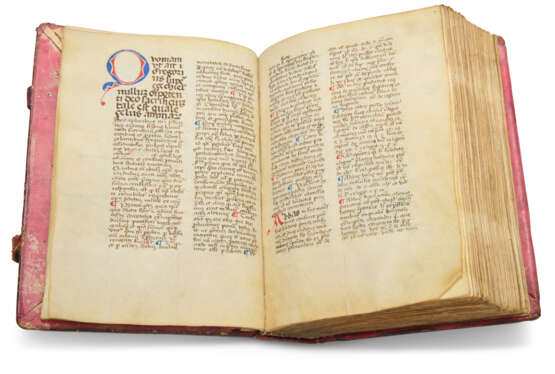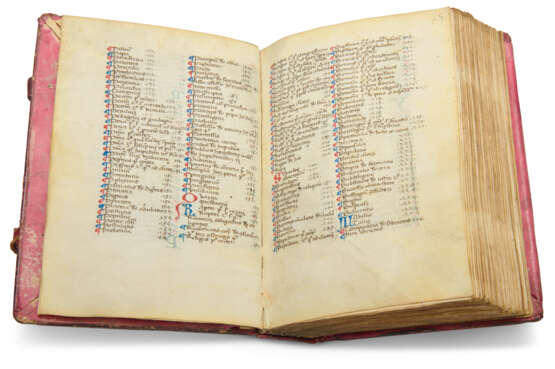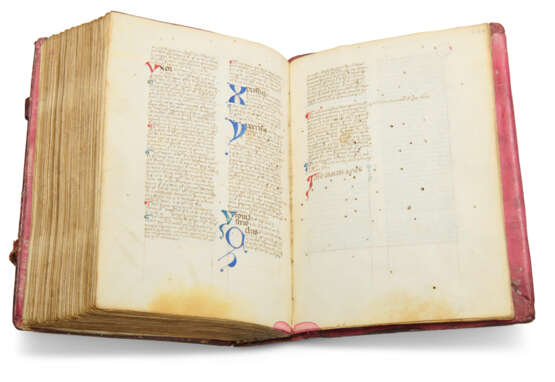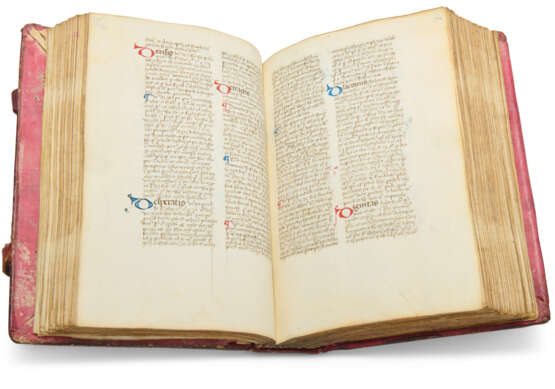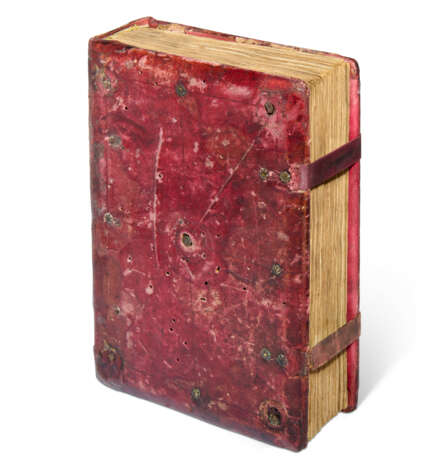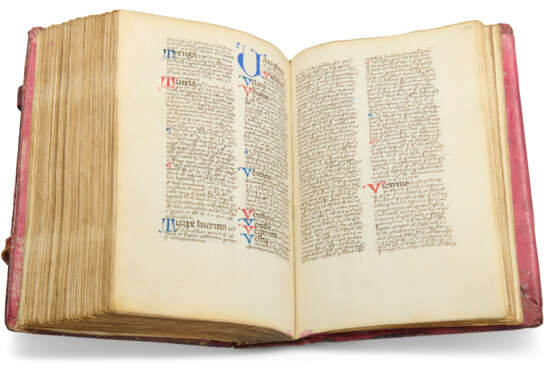ID 1214842
Los 38 | Bartolomeo da San Concordio (1262-1347)
Schätzwert
£ 10 000 – 15 000
Summa de casibus conscientiae, in Latin, decorated manuscript on vellum [The Netherlands], 1434
An extremely popular and influential text, this copy made less than six years after its publication, signed and dated by the scribe (recording that it took him six weeks to write), in a medieval binding.
190 × 135mm. i + 241 leaves, with contemporary foliation 1-250, used here, including the front flyleaf but omitting 201-202 and repeating 184 and 203, collation: 19 (of 10, lacking viii, f.8), 24 (of 10, lacking iii–viii, ff.14–19), 3–1810, 199 (of 10, lacking i, f.182), 20–2410, 259 (of 10, last blank cancelled), catchwords throughout, written in two columns of c.37-45 lines, in gothic script with incipits/headwords in larger more formal script, paraphs in red or blue, large initials throughout in red or blue, one puzzle initial in both colours, f.6v (the outer margin of f.42 excised with slight loss of text, a few stains and signs of use, slight worming at ends, but generally sound and with ample margins).
Binding:
Contemporary binding sewn on 3 red leather thongs laced into bevelled wood boards covered with red-stained blind-ruled leather, marks from bosses in centre and corners of each cover, small star-headed bosses around each cover and securing the straps of two strap-and-pin fastenings (worn and wormed, one strap modern, conserved by John Smart in 1987).
Provenance:
(1) A long and detailed scribal colophon records that the work was composed at Pisa by Bartolomeo in December 1338, and that this copy was written by the cleric William de Campis, of the diocese of Utrecht, for the Observant Franciscan brother Thomas de Bova of Calabria, and he tells us that he started on 13 May and finished on 24 July 1434 (‘[...] scriptum per me Guilgelmum Nicolai de Campis clericum Traiectensis dyocesis, pro religioso viro fratre Thome de Bova de Calabria ordinis fratrum minorum nuncupati de observantia […] MCCCCxxxiiij’; f.244). William apparently came from Kampen, near Zwolle in the large diocese of Utrecht, as did his contemporary, Thomas van Kampen (c.1380–1471), better known as Thomas à Kempis, author of the hugely popular De imitatio Christi, and prolific scribe (among other works, he is known to have copied the Bible four times). The colophon is followed by a version of a common scribal verse, ‘Qui scripsit scribat semper cum domino vivat, Vivat in celis Guilgelmus domino felix’, and it is interesting to note that exactly the same verse, also with the unusual spelling of ‘Guilgelmus’, occurs in a slightly earlier copy of the same text now at Berkeley University (Law Library, Robbins MS 135). Although the recipient Thomas de Bova was ‘of Calabria’, there is no reason to assume that the book was written there; the script, decoration, and binding appear to be northern, and it seems that William copied the book in the Netherlands. It may be relevant that there are two manuscripts signed by brother William Nicholas, monk of Amsterdam, at Utrecht University Library (MSS 205 and 264; see Colophons de manuscrits occidentaux, II, 1967, nos. 6004, 6005).
(2) The added documents concerning confession are signed ‘frater franciscus zena’ (f.245v).
(3) Unidentified Italian/Swiss owner, with their inscription ‘Libro antico senza autore, Littera A’ (f.1), sold at Sotheby’s 23 June 1987, lot 80 (described as southern Italian); bought by:
(4) The Schøyen Collection, MS 23.
Contents:
As the titles states, the text is a Compendium of Cases of Conscience, comprising: a list of contents (in alphabetical order, like the main text), with headwords and folio references, from ‘Abbas .7.’, to ‘Zelus .143.’, f.2, followed by notes, ‘Quesisti carissime cum dixerim in prologo summe de casibus conscientie […]’ and a version of the usual explanation on the abbreviations used for sources, ‘Iste sunt declarationes de breviatatibus ponitis in summa, Ac Accursius, Al Albertus, Ala Alanus […]’, ending ‘Deo gratias amen’ followed by a large red ‘H’; prologue: ‘Quoniam ut ait Gregorius super Ezechielem […] bene dictus pius postulo correctorem’, f.6v; main text: ‘Abbas in suo monasterio conferre potest suis subditis […] tunc est invidia ut dictum est supra invidia para secundo’, f.7, followed by a scribal colophon (see Provenance), f.244; the famous decree of Innocent III at the Fourth Lateran Council, that required Confession of all adult Christians at least once a year, under threat of excommunication: ‘Innocentius tercius in consilio generale. Omnis utriusque sexus […]’, f.244v, followed by a gloss, and Pope John XXII’s 1321 Bull ‘Vas electionis’, confirming the power of the pope and bishops to grant to mendicants the right to hear confession; the Regulae Iuris (maxims of Canon Law): ‘Beneficium ecclesiasticum non potest licite […] contra legis nititur voluntatem’, f.245v; blank, 247–249; Thomas Aquinas, Summa theologica, quaestio 63, article 2, on whether a second marriage is a sacrament, added later (c.1500?) : ‘Ad secundum sic proceditur. videtur quod secundum matrimonium non sit sacramentum […]’, f.249v; blank, f.250v.
The texts added at the end of the volume give interesting insights into the concerns of various owners. The first was presumably a mendicant who heard confession, and the last was presumably married twice (Aquinas affirmed that a second marriage is indeed a sacrament). The Regulae Iuris are a series of maxims of which the last is representative: ‘It is certain that those who comply with the letter of the law but against the intention of the law, are really against the law’.
| Herkunftsort: | Italien, Europa |
|---|---|
| Kategorie des Auktionshauses: | Handschriften des Mittelalters und der Renaissance, Bücher und Handschriften |
| Herkunftsort: | Italien, Europa |
|---|---|
| Kategorie des Auktionshauses: | Handschriften des Mittelalters und der Renaissance, Bücher und Handschriften |
| Adresse der Versteigerung |
CHRISTIE'S 8 King Street, St. James's SW1Y 6QT London Vereinigtes Königreich | |
|---|---|---|
| Vorschau |
| |
| Telefon | +44 (0)20 7839 9060 | |
| Aufgeld | see on Website | |
| Nutzungsbedingungen | Nutzungsbedingungen |
